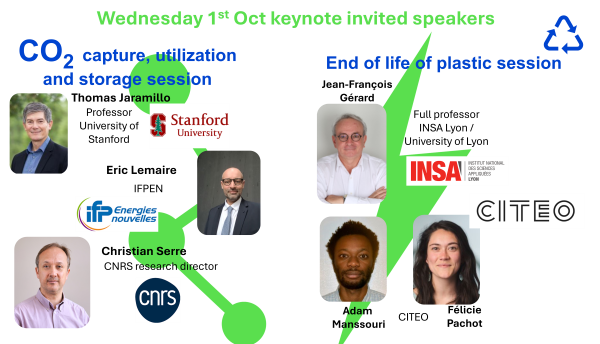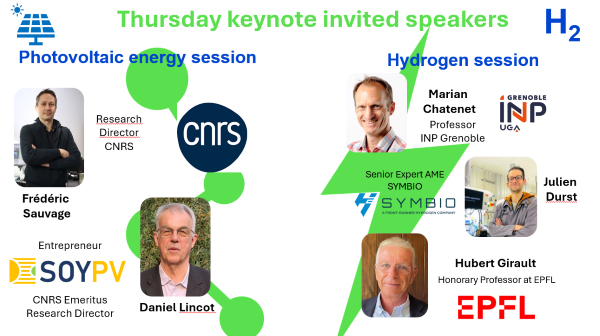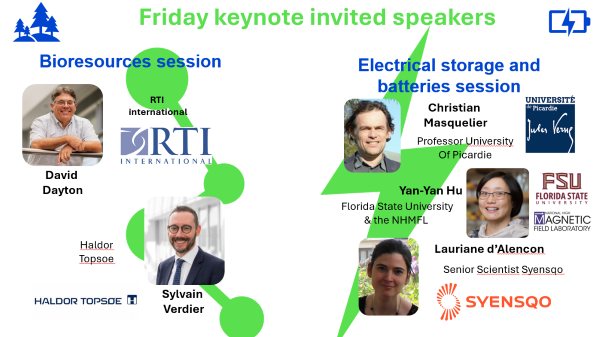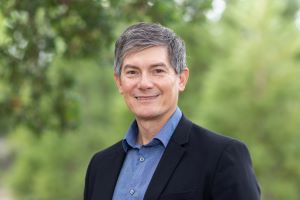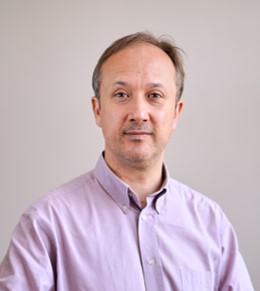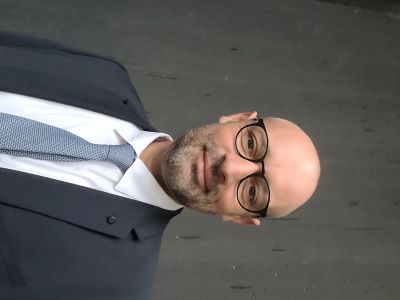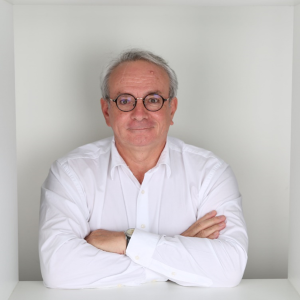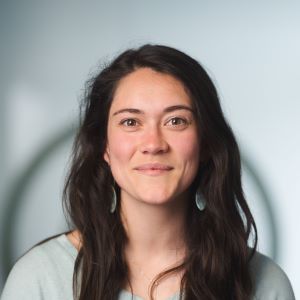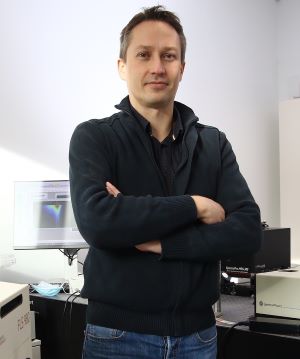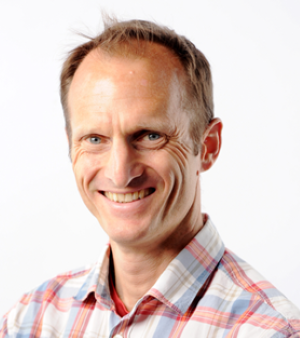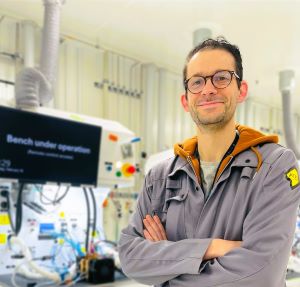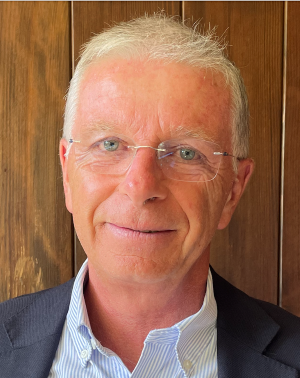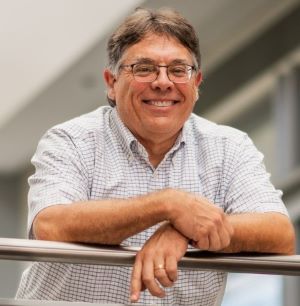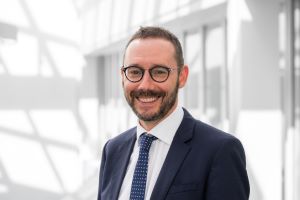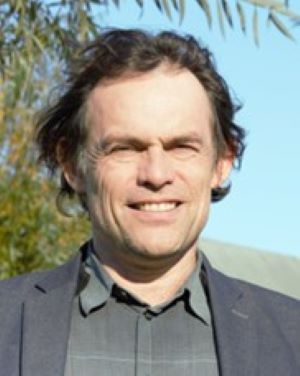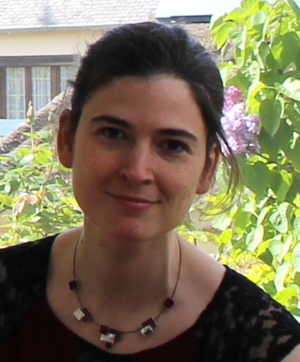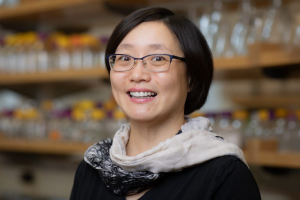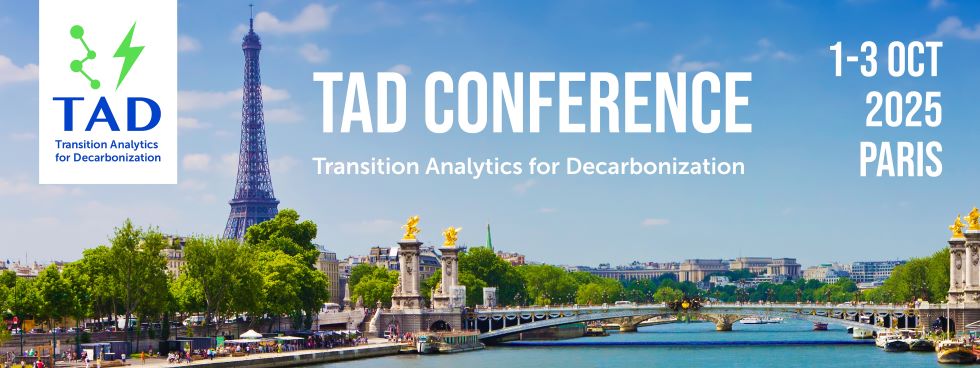
About the conference > Keynotes speakersKeynotes speakers We are delighted to announce the invited speakers for the TAD conference. A new speaker will be revealed each week starting Monday, January 27th. Stay tuned to discover the experts who will share their knowledge and experiences. You will find the complete bibliographies of each speaker following their announcement.
CO2 capture, utilization and storage session Academic Keynote Speaker: Thomas F. Jaramillo from University of Stanford Thomas Francisco Jaramillo is a Professor of Chemical Engineering and of Energy Science Engineering at Stanford University, along with a faculty appointment in Photon Science at SLAC National Accelerator Laboratory. He serves as Director of the SUNCAT Center for Interface Science and Catalysis, a joint partnership between Stanford and SLAC. Prof. Jaramillo's research efforts are aimed at developing catalyst materials and new processes to improve sustainability in the energy and chemical sectors. Prof. Jaramillo has authored over 200 publications in the peer-reviewed literature in these areas, and has earned a number of honors and awards for his efforts, including the Paul H. Emmett Award in Fundamental Catalysis (2021) from the North American Catalysis Society, the Resonate Award (2014) from the Resnick Institute, and the Presidential Early Career Award for Scientists & Engineers (PECASE, 2011). Professor Jaramillo is from Carolina, Puerto Rico, earning a BS in chemical engineering at Stanford University and MS and PhD degrees in chemical engineering at the University of California, Santa Barbara. He then pursued post-doctoral research as the Hans Christian Ørsted Postdoctoral Fellow at the Technical University of Denmark, Department of Physics, prior to joining the Stanford faculty.
"My laboratory employs a broad range of analytical chemistry techniques, which collectively are essential for us to understand how catalysts operate and ultimately, how to design and develop improved systems for energy conversion."
Academic Keynote Speaker: Christian Serre from CNRS Christian Serre is a research director at the CNRS. He obtained his PhD in materials chemistry in 1999 under the supervision of Professor Gérard Férey at Versailles. After a post-doctorate in the USA at Rhodia, he began his career at CNRS in 2001 at the Lavoisier Institute in Versailles, where he was one of the main discoverers of the reference MOFs ‘MIL’ (Matériaux Institut Lavoisier). In 2016, he set up a new Institute dedicated to porous solids and associated composites for the environment, energy and health at the École Normale Supérieure and ESPCI Paris, CNRS and PSL University. To date, he has published over 450 papers and holds 43 patent families (H factor > 139, > 90,000 citations). Christian is one of the co-founders of SquairTech, a start-up dedicated to indoor air quality. He has received numerous scientific awards, including the state-funded prize of the French Academy of Sciences, of which he has been a member since 2024. “Advanced characterization: an indispensable toolbox for the design of new adsorbents.”
Conférencier invité secteur industriel: Eric Lemaire, Head of fluid analytical department, IFPEN Eric Lemaire is a process engineer graduated from the Institut National des Sciences Appliquées of Rouen, specializing in process engineering, in 1998, and also holds a DEA (Advanced Studies Diploma) from UTC Compiègne. He began his career in 2000 at IFPen as a process engineer in the field of gas treatment and later worked on CO2 capture. From 2007 to 2011, he led a CO2 capture project named HiCapt+ in collaboration with Enel. Between 2011 and 2013, he managed an ANR project focused on the energy, economic, and environmental efficiency of processes at the territorial level. From 2012 to 2023, he conducted projects on catalytic reforming and xylene separation. Since 2023, he has been in charge of the analytical department for fluid characterization
"Advancing from fundamental insights to industrial reality, innovation in CO₂ capture relies on analytical methods that transform knowledge into sustainable solutions."
End of life of plastic session Academic Keynote Speaker:
Prof. Jean-François GERARD got a PhD in Macromolecular Materials Science in 1985. He is currently Full Professor at INSA Lyon/Université de Lyon in Materials Science Engineering and Polymer Science and develops research activities within the UMR CNRS 5223 ‘Ingénierie des Matériaux Polymères’. He began as CNRS Research Scientist at the UMR 5627 ‘Relations Structure-Propriétés des Polymères’ lab. He headed the UMR CNRS 5223 laboratory from 2002 to 2011. Since the beginning of his career, he dedicates his researches to the design of various polymer-based materials. His interests are focused on nanostructured polymers and nanostructuration processes - (nano)microphase separation phenomena from RIPS, hybrid organic-inorganic nanomaterials from introduction of metal oxo-clusters or considering sol-gel chemistries, ionic liquids, nanoparticles and nanocomposites -, interfaces and interphases in blends and composite materials (from nanocomposites to fiber-based composites), surfaces, coatings and adhesives, etc. Numerous of his researches are done within collaborative projects with Industry. He is the author of about 330 papers in scientific journals, 21 patents, about 175 invited international conferences, and he supervised 89 PhDs. He acted as vice-coordinator of NANOFUN-POLY (Nanostructured and Multi-Functional Polymer-Based Nanomaterials and Composites) European Network of Excellence and from 2007 and as Vice-President of the European Center for Nanostructured Polymers (ECNP). He has numerous consulting activities and participation in boards, scientific learning societies, such as President of the European Polymer Federation. He actually supervises the PEPR Recycling (National Research Program sponsored by France 2030 agency).
Industrial Keynote Speaker: Félicie Pachot from Citeo
"Our goal is to promote eco-design decisions and secure recycling loops. Analytical chemistry is essential to anticipate the impacts of substances brought into the recycling process, as the main challenge is to detect and quantify all substances of concern at different stages."
Adam Manssouri from Citeo
Photovoltaic solar energy session Academic Keynote Speaker: Frédéric Sauvage from CNRS Frédéric Sauvage is a research director at CNRS. After completing a doctoral thesis under the supervision of Jean-Marie Tarascon in 2006, he joined the team of Prof. Kenneth R. Poeppelmeier at Northwestern University (USA), where he worked between 2006 and 2007 on the synthesis of new materials for primary batteries and new transparent conductive oxides. He then joined the Swiss Federal Institute of Technology in Lausanne (Switzerland) under the supervision of Prof. Michael Graetzel until 2010 to improve the efficiency of dye-sensitized solar cells. He then joined CNRS as a research fellow. He founded a new research theme around solar energy conversion (Photovoltaics and Photocatalysis) within the Laboratory of Reactivity and Solid State Chemistry (CNRS UMR7314) in Amiens. His research focuses on breakthrough topics, balancing fundamental research and valorization. He is the originator of several new patented and valorized concepts such as photorechargeable batteries, transparent and colorless photovoltaic cells, or the production of green hydrogen from sugars. He is the co-founder of two CNRS spin-offs that valorize his work: G-Lyte in 2019 on the development of PV cells converting artificial light energy inside buildings and CrystalEnergy very recently on the industrial development of electrogenic glazing. In 2023, he received the European ERC Advanced Grant excellence scholarship for a research program aimed at creating ultra-short X-ray pulses in the laboratory to study structural dynamics during light absorption and understand the origin of the very first degradation mechanism in these materials (GEMINI project).
" At the core of my research, advanced analytical chemistry unveils how PV materials behave under external stressors."
Industrial Keynote Speaker: Daniel Lincot, Emeritus Research Director at CNRS and Entrepreneur Daniel Lincot is an engineer from ESPCI. He began his research on photovoltaics in 1978 and joined the CNRS in 1980 at Chimie Paristech-PSL. He dedicated his doctoral thesis to the photoelectrochemistry of semiconductors before focusing on the study of electrochemical processes for the development of thin films and interfaces for photovoltaics. In 2002, he co-founded the IRDEP in Chatou with EDF, CNRS, and Chimie Paristech, aiming to industrialize the production of CIGS solar cells using electrochemical methods. This initiative led to the creation of NEXCIS by EDF in 2009. Daniel Lincot continued with the establishment of the IPVF (Institut Photovoltaïque d’Île-de-France), where he served as Scientific Director from its inception in 2013 until 2019. In 2021, he co-founded the startup SOYPV, which aims to manufacture tandem thin-film solar cells in France using electrochemistry. He was a visiting professor at the Collège de France in 2021–2022, holding the Liliane Bettencourt Chair of Industrial Innovation. In 2023, he became a member of the Académie des Technologies. In 2024, he received the Vittorio de Nora Grand Prize from the Electrochemical Society and the European Edmond Becquerel Prize for photovoltaics. "The growth of thin-film semiconductors in water has always been a dream for me, and opens up new industrial development prospects for CIGS-type thin-film photovoltaics."
Hydrogen session Academic Keynote Speaker: Marian Chatenet from the INP Grenoble Marian Chatenet holds a master in electrochemistry and an engineer degree in materials sciences (1997 - Grenoble Institute of Technology, Grenoble INP), obtained his PhD in Electrochemistry (2000, Grenoble INP), then made a post-doc at the University of Minnesota (2000-2002). He was appointed associate professor in electrochemistry (2002), then professor in Grenoble INP/Phelma (2011). He studies electrocatalysis of complex reactions and electrocatalysts’ activity/durability in fuel cells/water electrolyzers within the laboratory of electrochemistry and physical-chemistry of materials and interfaces (LEPMI). Best young scientist in Electrochemistry (French Chemical Society, 2009), he received the Oronzio and Niccolò De Nora Foundation Prize of the International Society of Electrochemistry on Applied Electrochemistry (ISE, 2010) and the prize for best senior researcher in Energy Technologies of the French Chemical Society (2025). He has published 200+ papers in scientific journals, given 250+ communications in (inter)national conferences (ca. 60 invited/keynotes/plenary), 55+ invited seminars and filed 9 patents (h-index = 60, 12000+ citations – Scopus, May 2025). After having led the team of Interfacial electrochemistry and processes (EIP) of LEPMI for 10 years, he initiated a joint laboratory between LEPMI and Michelin and has built multiple collaborations with industrial partners and laboratories in France and abroad. Co-head of the mobility axis of the "French Research Network on Hydrogen" (FRH2, research federation n°2044 from CNRS), he leads PEMFC95, a research program on PEMFC for heavy-mobility applications within the ANR-sponsored PEPR-H2 (10 partners, ca. 9 M€ funding, ANR-22-PEHY-0005). He became scientific director of HYNOLOGY company in 2024.
"Electrochemical hydrogen technologies (fuel cells ans water electrolyzers) are so complex that their electrochemical characterizations alone cannot unveil the different phenomena at stake on the materials, interfaces and in the systems. Advanced physicochemical characterizations, ex situ, in situ and operando, are absolutely mandatory to reach sufficient understanding and solve the problems we face to deploy them industrially.”
Industrial Keynote Speaker: Julien Durst from SYMBIO Julien Durst holds a degree in electrochemistry and materials science from ENSEEG (2009 – Grenoble INP – Phelma, Université Grenoble Alpes). He earned his PhD in 2012 from Université Grenoble Alpes, with a dissertation entitled “Study of the Aging of Membrane-Electrode Assemblies for Low-Temperature Fuel Cells,” conducted at LEPMI under the supervision of Frédéric Maillard and Marian Chatenet. Following his PhD, he continued his research at prestigious academic institutions such as the Technical University of Munich (TUM) and ETH Zurich, before transitioning to the industrial sector with Saint-Gobain. In 2019, he joined the Air Liquide group through its subsidiary Axane, as a project manager for technological development in proton exchange membrane fuel cells (PEMFC). Since 2021, he has been working at SYMBIO in Lyon Saint-Fons, where he played a key role in launching the membrane-electrode assembly (MEA) development program, setting up a materials analysis laboratory, overseeing academic collaborations, and managing a team dedicated to MEA design. As of May 2025, he holds the position of Senior Expert MEA for PEMFCs at this pioneering hydrogen mobility company. His research and innovation efforts primarily focus on: the relationship between the physicochemical properties of MEA constituent materials and the overall electrochemical performance of PEMFCs; design criteria for MEAs to enable efficient operation at high temperatures (100–110 °C); and degradation mechanisms of membrane-electrode assemblies under real-world operating conditions.
“It is not doubt that weakens science, but the absence of doubt regarding fragile data.”
Academic Keynote Speaker: Hubert Girault from EPFL Prof. Hubert Girault is Honorary Professor at EPFL, where for many years he headed the Laboratory of Physical and Analytical Electrochemistry. In analytical chemistry, his work has focused on biosensors, microfluidics, electrophoresis and ionization methods for mass spectrometry. More recently, his research activities in electrochemistry have focused on the physico-chemical aspects of batteries and hydrogen production methods.
Bioresources session Academic Keynote Speaker: David C. Dayton from RTI International Dr. David C. Dayton is a Senior Fellow (Chemistry) at RTI International with 30 years of project management and research experience in biomass thermochemical conversion R&D projects involving biomass combustion, gasification, and pyrolysis. His current research activities include catalytic biomass pyrolysis technology development, biocrude separations and upgrading, synthesis gas conversion, cleanup, and conditioning, and experimental programs relating to biomass thermochemical conversion for biofuels and bioproducts. These R&D activities are focused on expanding integrated biorefinery technology development activities for advanced biofuel production. Prior to coming to RTI, Dr. Dayton managed biomass thermochemical conversion projects for the U.S. Department of Energy at the National Renewable Energy Laboratory and was a postdoctoral research associate at the U.S. Army Research Laboratory, Aberdeen Proving Ground, MD. He received his Ph.D. in Physical Chemistry from the University of North Carolina, Chapel Hill and a B.S. in Chemistry from Dickinson College. Dr. Dayton has published over 70 technical papers, book chapters, and government reports. He recently co-authored a book entitled “Analytical Methods for Biomass Characterization and Conversion” and has adjunct faculty positions in the Energy and Environmental Systems Department at North Carolina A&T State University and in the Forest Biomaterials Department, College of Natural Resources, North Carolina State University.
"Don’t focus on what you can measure but what you should measure. The chemistry of bio-derived liquids is extremely complex so select the best analytical method (or methods) available to you. Connecting molecular-level details to process chemistry has tremendous potential to accelerate technology development."
Industrial Keynote Speaker: Sylvain Verdier from Haldor Topsoe Sylvain Verdier is a Chemical Engineer with an MSc in Chemical Engineering from the University of Pau, France, and a PhD in Chemical Engineering from the Technical University of Denmark. With close to 20 years of experience at Topsoe, he has held various positions in R&D, Product Development, and Marketing. Currently, Sylvain works as a Senior Strategy Manager, providing guidance to internal and external stakeholders on managing the energy transition with focus on transport fuels. His expertise lies in technologies, regulations, sustainability, and feedstocks for renewable fuel production, particularly in the road, aviation, and marine sectors. In addition to his strategic role, Sylvain actively contributes to Topsoe's thought leadership activities, hosting the 'Fuel for Thought' podcast that has exceeded 2 million downloads earlier this year."
Electrical storage and batteries session Academic Keynote Speaker: Christian Masquelier from University of Picardie Christian Masquelier joined Université de Picardie Jules Verne, Amiens, France, as a Full Professor of Chemistry. He has been working for >30 years on the crystal chemistry of sodium ion conductors and positive electrode materials for Li-ion and Na-ion batteries, in particular on operando X-ray or neutron diffraction of phosphate-based positive electrodes. He is the co-author of ~180 publications and 25 international patents on important materials in this field (LiFePO4, Na3V2(PO4)2F3, Li3PS4, Na2V2(PO4)3,…). He served as the Director of the Doctoral School of UPJV Amiens, as the Director of the ALISTORE European Network and as the President of the “Chemistry of Materials” Section of the French National Council of Universities (CNU33). He is presently a Senior Member of the Institut Universitaire de France, the Coordinator of the DESTINY Marie Curie PhD project and the Director of the Laboratoire de Réactivité et de Chimie des Solides (LRCS, UMR CNRS 7314) in Amiens, France.
"I love looking at how materials behave within a battery, in particular through operando X-ray or neutron
Industrial Keynote Speaker: Lauriane d'Alencon from Syensqo Lauriane d’Alençon is a chemist, expert in Inorganic and Hybrid materials. She joined Rhodia and then Solvay 20 years ago working on R&D projects to develop new materials for different applications such as catalysis, optics and energy storage. She is now managing the lab at Syensqo dedicated to future generation of batteries and especially All Solid State Batteries. She has been also involved in several collaborations with academic labs (European Projects, PhD, Post-docs) on different topics. She is co-author of more than 50 patents and papers in inorganic chemistry field. She also gives regular lectures in Engineer Schools (ENSMAC, ESNCP) and is deeply involved in promoting chemistry experience and passion to students (Prix Jeune de l’Innovation, Forums).
"Among all my experience in synthesis of inorganic materials from nano- to micronic scales, I have always considered facing analytics challenges as the key of success ! It is even more true for Battery Materials as the application itself is as complex as a full lab ! "
Academic Keynote Speaker: Yan-Yan Hu from Florida State University & the NHMFL Yan-Yan Hu earned her B.S. in Chemistry from Tsinghua University (Beijing, China) in 2006 and her Ph. D. in Analytical Chemistry, with a focus on solid-state NMR method development and applications, from Iowa State University (Ames, Iowa) in 2011, advised by Prof. Klaus Schmidt-Rohr. She then conducted postdoctoral research in energy materials as a Royal Society Newton Fellow and Marie Curie Research Fellow at the University of Cambridge (2011–2014), under the supervision of Dame Prof. Clare Grey. In 2014, Dr. Hu joined the Department of Chemistry and Biochemistry at Florida State University as an Assistant Professor, earning promotion to Associate Professor with tenure in 2019 and Full Professor in 2022. Dr. Hu holds a joint appointment at the National High Field Magnetic Laboratory (NHMFL). Her research focuses on advancing magnetic resonance techniques to investigate interface chemistry, ion transport, and microstructure formation in energy materials and biomaterials. She has over 90 publications in peer-reviewed journals and holds 10 patents. She is a recipient of the Marion Milligan Mason Award from the American Association for the Advancement of Science (2016), the Emerging Young Investigator Award from the Florida Section of the ACS (2017), the CAREER award from the National Science Foundation (2019), and the Agnes Fay Morgan Research Award from Iota Sigma Pi (2025). Dr. Hu served as an Associate Editor for Materials Today Chemistry, a Guest Editor for the Journal of Magnetic Resonance, and currently holds the role of Topical Editor for Chemistry of Materials.
“I am fascinated by the power of magnetic resonance to reveal interfacial chemistry and ion dynamics—key processes that shape the behavior of both functional materials and biological systems.”
|
